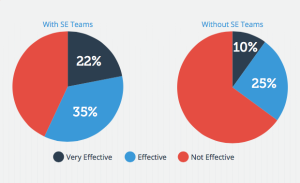Updated for 2021: State of Sales Enablement 2021
 In the last 5 years, the importance of Sales Enablement has skyrocketed, due to its ability to increase sales productivity and effectiveness. Leading organizations are forming specific Sales Enablement teams dedicated to this task and the market for Sales Enablement technology solutions has exploded.
In the last 5 years, the importance of Sales Enablement has skyrocketed, due to its ability to increase sales productivity and effectiveness. Leading organizations are forming specific Sales Enablement teams dedicated to this task and the market for Sales Enablement technology solutions has exploded.
According to Aberdeen research, these leading organizations are seeing incredible results such as:
- 50% increase in sales team quota attainment
- 9% advantage in year-to-year revenue growth over average companies
- 4% year over year growth in average deal size (ASP)
But how many companies are taking advantage of this opportunity? And how well have they implemented sales enablement programs to achieve these results? What are sales enablement activities, how effective are they, and how actively are organizations executing them?
These were the questions at the heart of a groundbreaking study conducted in August 2015 by Highspot and Heinz Marketing among more than 400 B2B sales and marketing professionals.
The results may surprise you. The importance of sales enablement activities rank high across all organizations, but there is clearly a gap between the ‘have’ and the ‘have nots‘ in achieving the intended results. Many of the pains of sales-marketing misalignment exist across many organizations.
- Only 48% of organizations surveyed thought their sales efforts were effective
- Across all areas of sales enablement that scored as very important, effectiveness in each area was only moderate (4-6 on 10 point scale)
- Organizations with Sales Enablement teams scored 25% higher in sales effectiveness
- Organizations with Sales Enablement teams showed strongest gains in improving conversion rates and increasing sales productivity
We hope these insights help you prioritize your efforts and provide focus heading into 2016.